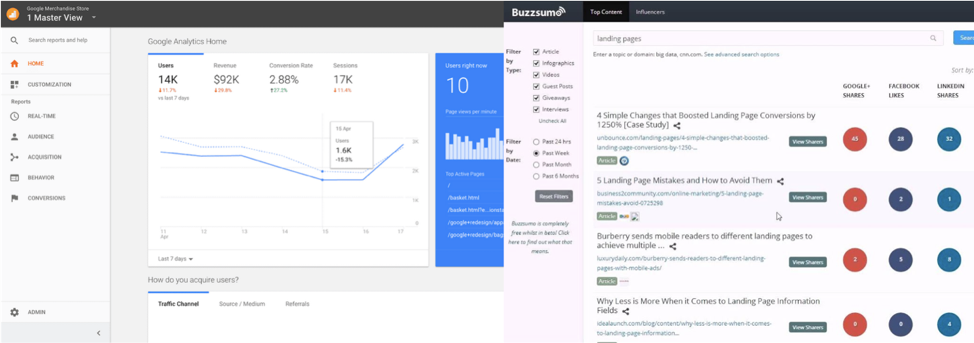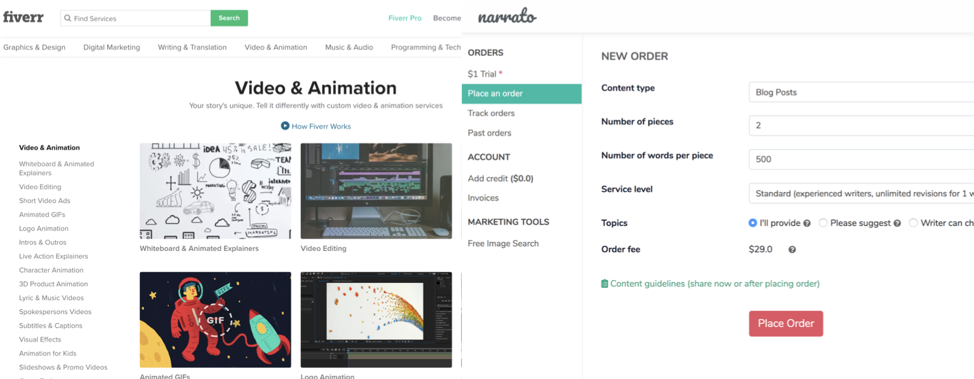Small businesses face a lot of challenges and marketing on a small budget is one of them. As a small business or solopreneur, you may not have the finances or the revenues to justify a large digital marketing budget like that of a big company, but does that mean you have no hope?
Of course not!
Any size of marketing budget can generate you good returns, provided you use the money the right way. Let’s look at the Top 7 ways to work real magic with a small digital marketing budget:
Acquiring a new customer costs 5X more than retaining an old one. Also, interestingly, you have a 60%-70% higher success rate when selling to an existing customer, compared to a new customer (who has 5%-20% success rate)? This should be incentive enough for you to retarget your existing customer base.
One of the best ways to inspire purchases from old customers is through email marketing. According to a study, email marketing has an ROI of 42:1. In fact, emailers outperform other marketing mediums tremendously in their reach and speed of conversions. They help you prevent shopping cart abandonment and they remind inactive users of the existence of their account.
When retargeting through emails, create activity-specific campaigns. So, while a regular visitor receives a discount code, an unsubscribed customer receives a friendly “How do you do?” message. Your inactive customers can receive a newsletter of all the changes you’ve implemented since their last visit. This personalization can really do wonders.
You could also double your opt-ins. This strategy has been found to increase ROI to 45:1, because it focuses on targeting customers who actually want to receive your mail. This strategy also ensures that your email ID isn’t put into the spam folder.
Finally, you should send your retargeting emails within 3 hours of your customers abandoning their shopping cart or exiting your website. This increases email open rates by 40% and CTRs by 20%, giving you a second chance to initiate a purchase.
One of the best ways to ensure that your digital marketing stays within budget is to promote only to qualified leads. A really effective way to generate high-potential leads is through content marketing. The thing is, content marketing costs up to 41% less per lead, compared to other tactics, such as paid search. So consider actively posting high-quality content on your blogs and social media channels.
Blog posts are the most shared content online. Today, posts that are on average 1200 words in length and which have a title length that ranges between 6 & 13 words, have the highest readership. These can get you a lot of leads.
Videos are another great way to catch the attention of your audience. They can generate 66% more leads compared to other forms of content. Some of the most-watched videos are those which are live streamed.
You can also consider hosting webinars on your website or social media platform. At least 20%-40% of webinar attendees become qualified leads and 2%-5% get converted. You can use free video conferencing tools like UberConference, Zoom and Appear.in to host your webinar.

60% of marketers claim that they repurpose a piece of content 2-5 times. This is because of the immense potential reused content has in targeting different categories of prospects. These bite-size pieces of content are not only easier to digest, but they can also be optimized for different platforms.
Content monitoring & research tools like Google Analytics, Buzzsumo and Ahrefs allow you to find your most-read, most-liked and most-shared content; which you can then repurpose.

So, how can you reuse your evergreen content? Here are some examples:
[insert page='the-10-best-content-marketing-tools-you-need-in-2020' display='single-related-article-02.php']
So far, we’ve been working under the assumption that you already have some content on-hand. But what if you don’t? Can you afford the cost of creating content in-house or hiring part or full-time writers?
A study of salary structures posted on top job boards and staffing websites show that a writer’s fees can start at $23 per hour and go on to hundreds of dollars, depending on their experience, skill and specialization. But this cost doesn’t stop here. If you hire a writer, you’ll need to hire an editor too - a role whose salary exceeds $50,000 per year.
If you think you’ll be able to reduce your expenses by hiring an external marketing agency to take care of your content needs, think again. Research by Glassdoor shows that a marketing agency can cost a company approximately $598,572 per year, in the Detroit Metro Area. This cost can increase significantly in other cities.
Both of these solutions can exceed your budget. But there is a workaround - freelance marketplaces.
Freelancing websites allow you to post jobs on their platform and commission work to qualified freelancers. Take Fiverr for example, where you can find freelance translators, graphic designers and voice over artists at reasonable cost. And then there are dedicated textual content platforms like Narrato, where you can find writers from across niches, who can produce quality content at very pocket-friendly rates.

Just a while ago, I mentioned about the immense potential videos had in digital marketing. Apart from live videos, instructional and explainer videos too are exceptionally far-reaching in their impact. These videos are educational and engaging. They don’t hard-sell, but they pique the curiosity of viewers and push them towards the next step - active search for the product/service. Research shows that 95% of customers watch explainer videos before making any purchase decision and when both text and videos are available, 72% of website visitors prefer to watch the video.
Of all instructional videos, How To videos are the most powerful. They are great for engaging with the audience, they offer actionable solutions and they show the product/service in use. If you’d like to see a really good instructional video, take a look at CrazyEgg’s advertisement. Then of course, there is the legendary explainer video by the Dollar Shave Club.
Ideally, your instructional videos should be 2-3 minutes long and your script shouldn’t exceed 200 words. If you’re making a long video, don’t exceed beyond 6 minutes, that’s when engagement sees a steep drop.
To really make your video shine, clean it up using a top-class, but affordable video editing tool. Adobe Premiere Elements 2019, Corel VideoStudio Pro and CyberLink PowerDirector Ultra are some of the best video editing tools available under $100.
[insert page='how-to-use-semrush-to-amplify-your-content-marketing' display='single-related-article.php']
Contrary to popular perception, not all social media sites host the same set of people.
Take the example of Facebook’s US demographics. Its largest user pool is the 18-29 age group, of which 54% are women and 46% are men. Most have completed college and are pursuing a job with a median salary of $75,000.
Now let’s look at Snapchat. 69% of their user base belongs to the 13-17 years age group. They are either still in school or starting college and their only source of income is pocket money or small earnings through temporary employment.
If you consider LinkedIn’s global user base, 90% of LinkedIn users have senior management positions. Most have median pay above $75,000 a year. This platform is home to 30 million companies, higher than any other social media platforms.
What do these figures tell you?
Each social media platform has its own, unique set of patrons. This is why you need to use the right digital marketing campaigns and target the right channel for the best results. So, if you want to target women buyers, your best bet would be Facebook. If you’re looking to bring your luxury brand to the mainstream market, LinkedIn would be great because of its high-income user base. Probably the only channel which hosts users across age groups, genders, education & income levels, ethnicity etc. is YouTube. Over 73% of Americans actively use YouTube everyday. In fact, it is the most-used channel in the country and the best place for a low-cost, mass marketing campaign.
When creating content for these channels, you should also focus on the type of content they like to consume. For example, memes and short posts work very well on Facebook; LinkedIn loves its statistics & research; behind-the-scenes shots & teaser photos work great for Instagram; game walkthroughs, How-to guides & sketches have lots of takers on YouTube; and current affairs related content really shines on Twitter.
The debate about which ads are better - search or social - is one that will never end. Research by Google shows that prospects who click on search ads are 27% more likely to buy something and often spend 10% more on their purchases. At the same time 37% of the global population uses social media ads to take purchase decisions. Social media is also the primary source of purchase inspiration for 42% of millennial and 50% of Gen Z population.
We can safely say that both types of ads are really important. But how do you ensure their effectiveness in getting you leads and conversions, especially when you’re on a shoestring budget?
Why, through geotargeting of course.
[insert page='6-essential-tips-for-keeping-your-content-relevant-and-ranking' display='single-related-article-02.php']
Geotargeting is the process of optimizing digital marketing campaigns for locations. But this isn’t restricted to finding places on the map and directing ads their way. It's also about identifying the best times for customer outreach, analyzing the profile of the customers who do respond and figuring out if this response is a frequent or a one-off event.
Once you figure out these details, you’ll be able to identify specific venues where your customers are most-likely to be. You can then use geofencing tools like Moasis, AdLeads and xAd to stream advertisements when your prospect walks into your geofenced neighborhoods. The best part about the xAd tool in particular, is that it uses a cost-per-visit pricing model , where you need to pay only when the customer actually visits your store & not otherwise. This can save you a lot of money.
You should geotarget based on time too. So, if your prospects are stay-at-home moms, they’ll most-likely visit stores during mid-morning or afternoon, after the family leaves the house. By optimizing for time, you can ensure that your ads, discount coupons and other marketing will be visible to your prospects at the time they are free to make a purchase.
Another way to geotarget on a budget, is to choose platforms that offer free search ads. For example, Google Ads gives $100 free credit to new sign-ups who spend a minimum $25 on the platform. You’ll have access to all the features and you’ll be able to geotarget easily.
When setting-up ads, use location-specific keywords. This will increase your chances of being found.
Digital marketing can yield amazing results, even when you’re on a small budget. Just follow the above tips and you’ll find that your engagement, leads and conversions soar.